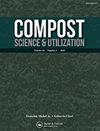蚯蚓粪在番茄栽培中的重要性及对某些土壤性质的改善
IF 0.9
4区 农林科学
Q3 ECOLOGY
引用次数: 0
摘要
摘要Vermicompost是一种受欢迎程度迅速增长的材料。然而,关于土壤中的使用量和矿化度,以及植物养分出现的状态的信息非常有限。在本研究中,旨在确定不同孵化期不同蚯蚓堆肥剂量对番茄植株土壤性质和养分浓度的影响。为此,将增加剂量的蚯蚓堆肥(0、20、40和60 t ha−1)混合到土壤中,并测定它们在不同培育期(0、15、30、45、60和90天)对土壤性质的影响。在孵化期结束时,番茄植株生长出来。在培养阶段结束时,测定了蚯蚓堆肥对土壤性质的残余影响。蚯蚓的药剂量和潜伏期的增加增加了土壤有机质的含量。随着蚯蚓堆肥剂量的增加,土壤中N、av-P、ex-K、ex-Ca、ex-Mg和av-Zn的总浓度增加。潜伏期的延长导致营养物质浓度的波动。蚯蚓堆肥剂量的增加对番茄植株的N、P和K浓度有正向影响,对其Ca、Mg、Fe、Zn和Mn浓度有负向影响,并且必须通过化学进料来补充。本文章由计算机程序翻译,如有差异,请以英文原文为准。
Importance of Vermicompost in Tomato Plant Cultivation and Improvement of Some Soil Properties
Abstract Vermicompost is a material whose popularity is rapidly growing. However, information about the usage amount and mineralization in the soil, and the state of the emergence of plant nutrients is quite limited. In this study, it was aimed to determine the effects of different vermicompost doses at different incubation periods on the soil properties and nutrient concentrations of the tomato plant. For this purpose, increased doses of vermicompost (0, 20, 40, and 60 t ha−1) were mixed into the soil, and effects of them on soil properties at different incubation periods (0, 15, 30, 45, 60 and 90 days) were determined. At the end of the incubation period, the tomato plant was grown. At the end of the cultivation phase, the residual effect of vermicompost on soil properties were determined. Vermicompost doses and the increase in incubation period increased the amount of soil organic matter. With the direct and residual effects of increased vermicompost doses, the total concentration of N, av-P, ex-K, ex-Ca, ex-Mg and av-Zn in the soil increased. Prolongation of the incubation period caused fluctuation of nutrient concentrations. Increased vermicompost doses positively affected the N, P, and K concentrations of the tomato plant, and negatively affected the Ca, Mg, Fe, Zn, and Mn concentrations of it. As a result, it was found that vermicompost improved the chemical properties of the highly calcareous Mediterranean region soils, but it was not sufficient for adequate and balanced feeding in plant production, and it must necessarily be supplemented by chemical feeding.
求助全文
通过发布文献求助,成功后即可免费获取论文全文。
去求助
来源期刊

Compost Science & Utilization
农林科学-生态学
CiteScore
4.10
自引率
0.00%
发文量
0
审稿时长
>36 weeks
期刊介绍:
4 issues per year
Compost Science & Utilization is currently abstracted/indexed in: CABI Agriculture & Environment Abstracts, CSA Biotechnology and Environmental Engineering Abstracts, EBSCOhost Abstracts, Elsevier Compendex and GEOBASE Abstracts, PubMed, ProQuest Science Abstracts, and Thomson Reuters Biological Abstracts and Science Citation Index
 求助内容:
求助内容: 应助结果提醒方式:
应助结果提醒方式:


